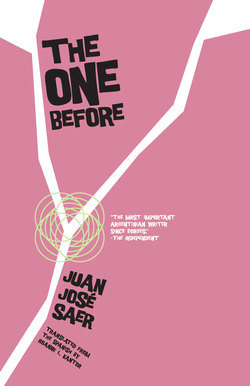Читать книгу The One Before - Juan José Saer - Страница 15
На сайте Литреса книга снята с продажи.
ОглавлениеScent Memory
In the interior, these days, you can’t be an empiricist, even if you have reached the age of sixty-six and teach philosophy classes at the University. I say that you can’t be an empiricist for this reason especially, most especially if you have three children (the eldest also a professor of philosophy, but in Canada), eight grandchildren, and a wife who follows you around the whole blessed day with wool socks, because she knows that at this point catching cold can be deadly. And nevertheless, it is old age, I think, that has made me an empiricist, because I prefer a world that is reborn every moment, whole, to a past that resembles an abandoned factory where minutes sprout like weeds among the debris and the machines. I corresponded with Francisco Romero for years but I never dared to tell him that his humanism seemed crazy to me—the writing hand advances now from one side to the other and will keep going and is filling this great white space with signs—that everything existence assumes about the past is nothing but a delusion, beneficial in certain cases, I’ll admit, but in the end a delusion. To me—oh how the boys would laugh if I said this in class—nothing exists but the present (not today, because “today” is too “broad” a concept for the idea I have of the present): my hand lifted in the air, now, that hangs at the height of the lamp (hanging, lamp, and height are three separate presents, each absolute, and only laziness makes me pull them together into a single sentence), and the room to one side, the bookcase that is behind me is nothing more than a delusion. It is my philosophy. It would be dishonest to explain it systematically. What’s more, for me there is no relationship of cause and effect (there is nothing more than a whole universe that plunges, whole, into nothingness and then reappears, plunges, whole again, and reappears infinitely), and it is the cause and effect relationship that serves as the skeleton for all philosophic discourse, including those who propose to negate the relationship of cause and effect. Cicero, Saint Thomas, Kant, and Hegel, that pretentious Frenchman who went to Holland to look for the “cogito,” are nothing more to me than sparkling specters whom I consider so little that they can’t scare me. Sometimes I sense in a smell unfurling before me the phantasmagoria of a past so vivid that for a moment it makes me waver. But then I reflect that I have done nothing more than sense a new smell, of such a particular type that it awakens sensations that evoke memories, but that are not memories themselves, simply because there is nothing to remember. The philosophy students know me for my love of grilled fish and white wine, for my affability and some rough and poorly made socks that my wife makes me wear all year round to stave off the cold.
